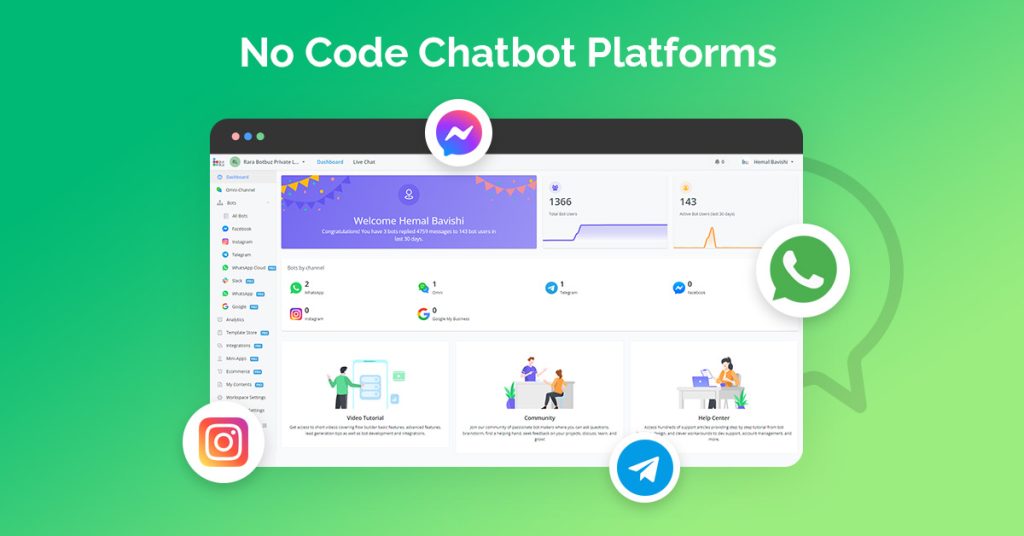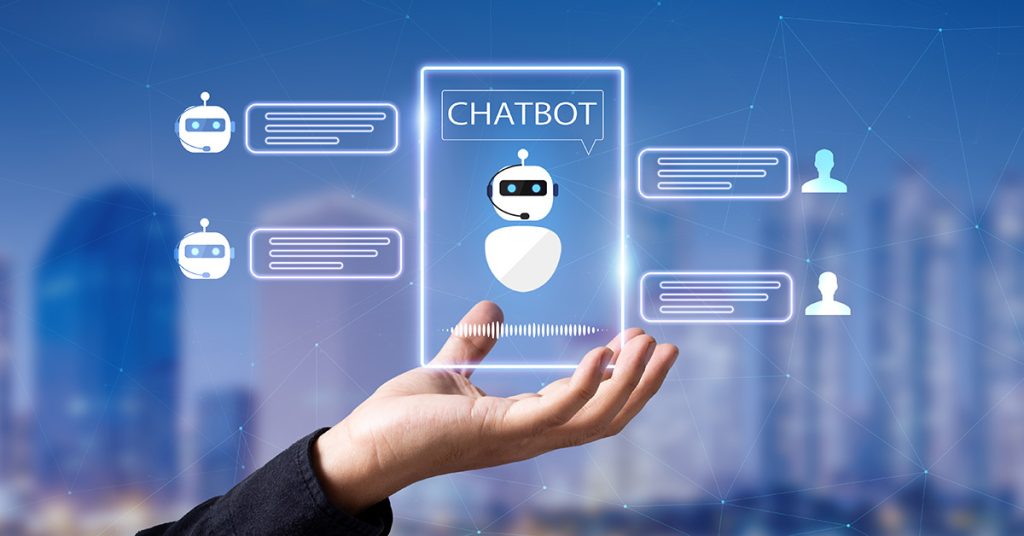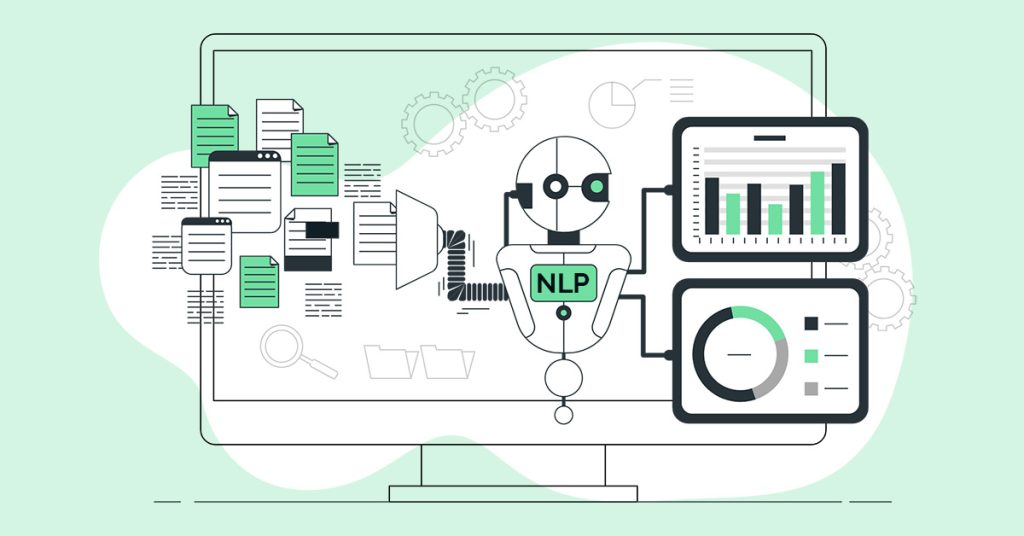- Growing Demand for Smarter, Automated Lead Generation :
- What is a Lead Generation Chatbot ?
- How Do Chatbots Enhance Lead Generation Efforts ?
- When to Use Chatbots for Lead Generation?
- Platforms to Deploy Lead Gen Chatbots :
- Lead Management Chatbots vs. Traditional Methods : A Business Perspective
- Use Cases Across Industries :
- Advantages of Using a Chatbot for Lead Generation :
- Using Botbuz Chatbot for Lead Generation :
Growing Demand for Smarter, Automated Lead Generation :
Think of lead generation as a business trying to find people who might be interested in what they sell. It’s like fishing – you’re casting a net to catch potential customers.
Now, because there’s so much happening online. Businesses need smarter ways to find these potential customers, or leads. They want systems that can automatically find and connect with people who show interest, without needing someone to do it all manually.
This is where chatbots come in. You might have seen them as little pop-up windows on websites that answer your questions. Well, these chatbots have gotten much smarter over time. They’re not just for answering simple questions anymore.
Marketing teams have realized that these smart chatbots can actually help find those interested people – the leads. They can talk to website visitors. It also understands what they’re looking for, and gathers their contact information.
When someone shows interest in a product or service online, it’s really important to talk to them right away. This real-time engagement means connecting with them at that very moment. If you wait too long, they might lose interest or go somewhere else.
So, why are businesses using chatbots for this? Because chatbots are available all the time, day or night. They can instantly chat with anyone who visits their website. It answers their initial questions, and figures out if they might be a good customer. This makes finding leads more efficient. Thus, providing a quick and helpful experience for the potential customer.
What is a Lead Generation Chatbot ?
Imagine a lead generation chatbot as a digital helper. Its main job is to find people who might want to buy something from a business. It’s like having a friendly virtual assistant on a website or app that’s specifically trained to ask the right questions to see if someone is a potential customer.
Its main purpose is to start conversations, understand what people are interested in, and get their contact details, like their name or email. This way, the business can follow up with them later.
Now, how is this different from a regular chatbot? Well, traditional chatbots are often there to help existing customers with their problems or answer common questions. A lead generation chatbot has a different focus. It’s all about finding new potential customers, not just helping the ones they already have. It’s designed to guide conversations in a way that uncovers interest and gathers contact information.
You can find lead generation chatbots in different places online.
- Some live right on a website. They might pop up and say hello, offering to answer questions or provide more information.
- Others work on WhatsApp. Businesses can use them to chat with people directly through the messaging app and see if they’re interested in their products or services.
- You’ll also find them on Facebook Messenger. If you message a business on Facebook, you might be talking to a chatbot that’s trying to understand your needs and collect your information.
- And if a business has a mobile app, they might have a chatbot inside that can talk to users and see if they’re a potential lead based on how they use the app.

So, no matter where you see them, these lead generation chatbots all have the same goal. They start conversations with people who might become customers and get their contact details for the business.
How Do Chatbots Enhance Lead Generation Efforts ?
One big way chatbots help is by giving instant answers to people’s questions. Imagine someone visiting a website late at night with a question. Instead of waiting until the next day for an email reply, a chatbot can answer them right away. This quick help keeps people engaged and interested.
Chatbots also allow for personalized conversations when trying to get contact information. Instead of just showing everyone the same boring form, a chatbot can ask questions based on what the person is looking at on the website. This makes the person feel like they’re having a one-on-one chat. It makes them more likely to share their details.
As the chatbot talks to someone, it’s also doing real-time data collection and figuring out if they’re a good potential customer. It can ask specific questions to see if they fit what the business is looking for. This means the business gets better quality leads and doesn’t waste time on people who aren’t a good fit.
Because chatbots are so responsive and helpful. They can also help reduce the number of people who leave the website without giving their information. They keep people engaged and answer their questions, guiding them through the process. Plus, they can continue to interact with these potential customers. Thus, providing more information and keeping them interested, which is what we call lead nurturing. This makes it more likely that these leads will eventually become actual customers.
When to Use Chatbots for Lead Generation?
Think about using a chatbot if your website gets a lot of visitors, especially at all hours of the day and night. It’s tough for people to be online 24/7 to answer everyone’s questions. A chatbot can be there around the clock to greet visitors. It answers basic questions, and grabs their contact info even when your team is sleeping.
Chatbots are also really useful when you’re running marketing campaigns. When people click on your ads or special offers, they’re usually pretty interested. If you have a chatbot ready on the page they land on, it can chat with them about the campaign. It also answer specific questions & get their details while they’re still excited about it.
Putting chatbots on product pages or special landing pages helps to turn visitors into leads. People on these pages are usually thinking about buying something. A chatbot can jump in, answer any last-minute questions they have. It guides them towards giving you their contact information, like offering a demo or a special deal. This can really help increase the number of people who become leads.
Lastly, if your business is growing and you’re getting more potential customers, but you don’t want to hire a ton of new salespeople right away, chatbots can help you scale. They can handle the initial conversations, figure out who the good leads are & collect their information. This lets your current sales team focus on talking to the most promising people and closing deals, without getting overwhelmed by too many initial inquiries.
Platforms to Deploy Lead Gen Chatbots :
Website Landing Pages: Your website, particularly landing pages designed for specific campaigns or offers. It is a prime location for a lead generation chatbot. Here, visitors are often actively seeking information or considering a purchase. A chatbot can engage them directly, answer their queries, and guide them through the lead capture process, such as offering a downloadable resource in exchange for their contact information or scheduling a demo.
WhatsApp Business: With its vast user base and direct messaging format, WhatsApp Business offers a powerful platform for lead generation chatbots. Businesses can use chatbots to initiate conversations (with user consent). It shares information about products or services, answers questions, and collects leads through interactive messages. This platform is particularly effective in regions where WhatsApp is the dominant messaging app.
Facebook Messenger: Integrating a lead generation chatbot with your Facebook Business Page’s Messenger allows you to engage with users who interact with your page or click on your Facebook ads. Messenger chatbots can automate initial interactions. It can qualify leads based on their responses & provide personalized information. Thus, seamlessly collecting contact details within the familiar Facebook environment.
Instagram DMs: Similar to Facebook Messenger, Instagram Direct Messages (DMs) can host lead generation chatbots. It is especially for businesses with a strong visual presence on the platform. Chatbots can interact with users who message your business. It responds to story mentions, or engages with specific content. Thus, guiding them through conversations designed to capture their interest and contact information.
SMS and RCS (Rich Communication Services): Using SMS and the more advanced RCS protocol enables businesses to deploy chatbots directly to users’ mobile devices. These chatbots can send personalized messages & answer questions. It also collects leads through interactive text-based conversations. RCS offers richer features like images, carousels & suggested replies. Thus, enhancing the chatbot experience on mobile.
Email Automation Workflows: While not a direct real-time interaction, chatbots can play a crucial role in email automation workflows. For instance, after a lead interacts with a chatbot on a website, their information can trigger automated email sequences. Furthermore, some advanced email platforms allow for conversational elements within emails. Thus, blurring the lines and enabling more interactive lead nurturing.
By strategically deploying lead generation chatbots across these diverse platforms, businesses can significantly expand their reach. It engages potential customers where they are most active, and creates multiple touchpoints for capturing valuable leads.
Lead Management Chatbots vs. Traditional Methods : A Business Perspective
Think about time. Chatbots are super quick. They can talk to many potential customers at once, day or night, and instantly get their basic info. With old methods like online forms, someone has to actually read the form and follow up later. And cold calling? That takes a lot of time just dialing numbers and often getting nowhere. Chatbots automate that first step, saving your team a lot of time.
Now let’s talk about money and resources. Setting up a chatbot costs some money at the start. But after that, it can handle a ton of conversations without needing more people. With forms and cold calling, you need a sales team, which means salaries and other costs. Chatbots can do the initial work of finding out who’s interested, so your team can focus on the really promising leads.
Being able to handle lots of leads and keeping communication consistent is another big plus for chatbots. If you suddenly get a lot of interest, a chatbot can handle it easily and give everyone the same good information. With traditional methods, your team might get overwhelmed. Also some people might not get a quick or consistent response. Chatbots make sure everyone gets the same level of service, no matter how busy you are.
Finally, chatbots give you better information about your leads. They track what questions people ask and how they interact with the chatbot. This gives you insights into what people are interested in and what works in your lead generation process. With old methods, it’s much harder to get this kind of detailed information and use it to improve things.
So, for a business, using lead management chatbots can save time and money. It helps you handle more potential customers & keep your communication consistent. Thus, giving you valuable data to make better decisions.
Use Cases Across Industries :
Think about online stores. Sometimes people put items in their shopping cart but don’t finish the purchase. A chatbot can pop up and ask if they need help. It even offers a small discount to encourage them to buy and grab their contact info for later. Chatbots can also answer questions about products right away. Thus, turning curious shoppers into potential leads.
In real estate, chatbots are making it easier to see properties. They can handle booking appointments to view houses or apartments at any time. They can also ask people what they’re looking for in a property, like where they want to live and how much they want to spend. Thus, helping agents to focus on the right buyers.
For healthcare, chatbots can help people schedule doctor’s appointments and get basic information. They can also collect some initial details from patients before their visit. It makes things smoother and more efficient for both the patient and the clinic.
Schools and universities are using chatbots to answer questions about their courses and how to get in. A chatbot can provide details on programs, requirements, fees, and deadlines instantly. It can also help guide potential students through the admissions process and collect their information.
Finally, for companies that sell software to other businesses (B2B SaaS), chatbots are great for scheduling demos of their products. If someone is interested in their software, a chatbot can ask them some questions to see if it’s a good fit and then book a live demonstration with a sales expert. This helps them find the right customers.
Advantages of Using a Chatbot for Lead Generation :
One significant benefit is higher conversion rates. This is largely due to the personalized interactions that chatbots can facilitate. By engaging visitors in tailored conversations based on their behavior and expressed interests, chatbots create a more meaningful connection. This personalized approach makes potential customers feel understood and catered to. It increases their likelihood of providing their information and moving further down the sales funnel compared to generic, impersonal methods.
Another compelling advantage is a lower cost per lead. By automating the initial stages of lead generation, chatbots reduce your business’s dependency on human agents for tasks like initial outreach, qualification, and answering frequently asked questions. This automation translates to significant cost savings in terms of salaries, benefits, and the time your sales team spends on early-stage lead management. Chatbots can handle a high volume of inquiries simultaneously at a fraction of the cost of human resources.
Furthermore, chatbots contribute to a better experience and increased lead engagement. The conversational approach offered by chatbots feels more natural and user-friendly compared to static forms or intrusive cold calls. Leads enjoy instant responses to their queries, eliminating frustrating wait times. Additionally, chatbots can provide relevant suggestions and guide users to the information they need quickly. It enhances their overall experience and makes them more likely to engage with your brand and provide their contact details.
Using Botbuz Chatbot for Lead Generation :
Botbuz Chatbot has several features that help you grab leads and automate the process. Think of it as a smart assistant that can talk to people, ask them questions to see if they’re interested in what you offer, and collect their contact information. It can also give them things like special offers or helpful guides to get their details. Plus, it usually has a way for you to see how well your chatbot is doing.
One of the cool things about Botbuz is that it can work smoothly with different messaging apps like WhatsApp and Instagram, as well as other online channels. This means you can have your chatbot talking to potential customers wherever they are spending their time online, all from one system.
Botbuz also lets you set up your own rules for figuring out if a lead is a good fit. You can create specific questions that the chatbot will ask to understand what the person needs and how likely they are to become a customer. And, it can often connect directly to your CRM (customer relationship management system). This means that when the chatbot gets someone’s contact info, it automatically goes into your system. Thus, it helps sales teams who can follow up without having to manually enter the data.
Now, imagine how this works in the real world. Let’s say a shop in Rajkot uses Botbuz with WhatsApp. They could run a special offer, and when people message them on WhatsApp, the Botbuz chatbot greets them. It asks a few questions about what they’re looking for, and then gets their contact details to send them the offer. Or, an online store could use Botbuz on their website. If someone is looking at a specific product, the chatbot can answer their questions. It suggests other items, and asks for their email address to send them more information later. Businesses that use Botbuz often see more leads, better quality leads, and their sales process becomes more efficient.
Conclusion :
In conclusion, the landscape of lead generation is rapidly evolving. It is demanding more efficient, personalized, and always-on solutions. Lead generation chatbots have emerged as a powerful tool in this transformation. It offers businesses the ability to engage potential customers instantly & personalize interactions at scale. Thus, gathering valuable lead data with remarkable efficiency.
By automating the initial stages of the sales funnel, chatbots not only enhance the customer experience through immediate responses and relevant information but also significantly reduce the cost and time associated with traditional lead generation methods. Their ability to operate 24/7 ensures that no opportunity is missed. While the data-driven insights they provide empower businesses to refine their strategies and focus their sales efforts on the most promising prospects.

Among the various chatbot platforms available, Botbuz Chatbot stands out as a comprehensive solution for businesses. It helps in elevating their lead generation efforts. Its robust features include customizable conversation flows, seamless integration with popular platforms like WhatsApp and Instagram. It also has the ability to create tailored lead qualification processes, making it a versatile asset across diverse industries.
The crucial capability of syncing lead data directly with CRM systems further streamlines the sales workflow. Thus, ensuring that valuable information is readily accessible to sales teams. Businesses are continuously seeking innovative ways to connect with and understand their potential customers. Lead generation chatbots like Botbuz, are playing an increasingly vital role in shaping the future of sales and marketing.




